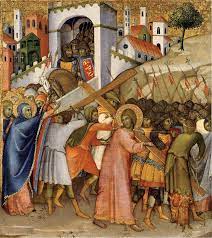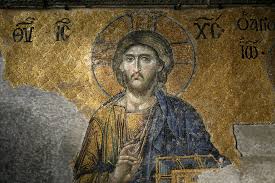________________________________________

When
we take the high road, sometimes we have to go low.
No,
that does not mean we take the low road, but we do have to go low.
What is
meant by that?
In
our current culture, it’s all about upward mobility:

In
the kingdom, it’s all about downward mobility (going low):
Uniting
with the poor and marginalized.
Serving
the unhoused, the undocumented, the prisoner, the outcast, the sick and dying.
Rejecting
the trappings of a warped culture of comfortability and entitlement.
Where
are we on this spectrum?

He
was canonized October 14, 2018.
With
Maryknoll, I was blessed to lead a pilgrimage to San Salvador, El Salvador, for
the first official celebration of St. Oscar Romero’s feast day: March 24, 2019.
Archbishop
Oscar Romero was assassinated on Monday, March 24th, 1980, while
celebrating Mass at a chapel near his home.
March
24th used to be a day of sad remembrance. Now it is a day of celebration
for one of the Church’s newest Saints.

The
first time was with Maryknoll in 2013. During the recitation of the Our Father,
I realized I was standing on the exact spot where his body fell and he died
after being shot by a sharpshooter’s bullet. It was a powerful moment of
reflection for this then newly ordained deacon.
The fig
tree parable in Luke’s Gospel is much different than that found in Matthew and
Mark. The parable there was about a cursed tree that bears no fruit, an
allusion to the Temple and the leaders of the Jewish faith at the time of Jesus.

Oscar
Romero was brought up in by a middleclass family and formed in Rome.
When
he was made Archbishop of San Salvador, many thought he would maintain the
status quo where the rich took advantage of the poor.
He
had been an Auxiliary Bishop in San Salvador and Bishop of the poor Diocese of Santiago
de Maria and was not remembered as a champion of the poor then.
But a
major event early in his tenure as the pastoral leader of El Salvador changed
his perspective. Three weeks after being installed as Archbishop of San
Salvador in 1977, his dear Jesuit priest friend was brutally murdered in
the nearby community Aguilares along with two other Salvadorans, a teenage boy
and an elderly man.

Fr. Rutilio
Grande was an outspoken proponent of peasants’ rights and preached against
injustice and oppression of his poor community of campesinos.
He
was the first priest to be assassinated just prior to the Salvadoran Civil War.
Many other priests would be killed during that Civil War.
This
past January, Fr. Rutilio Grande was Beatified in San Salvador by Cardinal
Gregorio Rosa Chavez.

Cardinal
Gregorio was Archbishop Oscar Romero’s Auxiliary Bishop and was passed over 17
times for promotion before Pope Francis elevated him to Cardinal in 2017.
A
sign of love from the God of second chances.
As
for Romero, his second chance came when his friend was killed, and he had to
choose: the poor and marginalized? Or the rich and powerful? Upward mobility?
Or downward mobility?
By becoming
the voice of the poor he knew someday he might suffer the same fate as his
Jesuit friend.

Take
for instance this homily at a Mass in Aguilares shortly after his friend was
killed:
“We are here today to
retake possession of this church building and to strengthen all those whom the
enemies of the Church have trampled down. You should know that you have not
suffered alone, for you are the church; you are the People of God; you are
Jesus, in the here and now. He is crucified in you, just as surely as He was
crucified 2000 years ago on that hill outside of Jerusalem. And you should know
that your pain and your suffering, like His, will contribute to El Salvador’s
liberation and redemption.”
Or
the homily he delivered moments before his execution three years later.
This
Gospel passage from John that led into the homily was prophetic in its own
right:

Here’s what Archbishop Oscar Romero
said in a homily moments before his death:
“Many do not understand, and they think Christianity
should not get involved in such things (as championing the poor). But, to the
contrary, you have just heard Christ's Gospel, that one must not love oneself
so much as to avoid getting involved in the risks of life which history demands
of us, that those who would avoid the danger will lose their life, while those
who out of love for Christ give themselves to the service of others will live,
like the grain of wheat that dies, but only apparently. If it did not die, it
would remain alone. The harvest comes about because it dies, allows itself to
be sacrificed in the earth and destroyed. Only by destroying itself does it
produce the harvest.”
Moments after delivering this homily, an assassin’s
bullet pierced his heart as he lifted the chalice during the beginning of the
Eucharistic prayer.

No
doubt Oscar Romero knew that he might die for speaking truth to power. And so,
it is with all of us.
We
are not called to take the easy road, the low road.
We
are called to take the high road, the difficult road, the road to Calvary.
We
are called not to be upwardly mobile, but downwardly mobile. Not to seek the higher
things. But accept the things that can lead to suffering and despair.
It’s
only by going low that we walk the road to Calvary with Jesus and find
our salvation.










